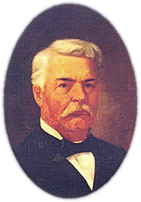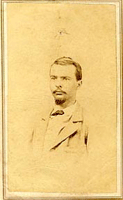|
|
Joseph Draper Sayers (1841-1929), son of David and Mary Thomas (Peete) Sayers, was born at Grenada, Mississippi, on September 23, 1841. In 1851 he moved with his father to Bastrop, Texas, where he attended Bastrop Military Institute from 1852 to 1860. In 1861 he joined the Fifth Regiment, Mounted Volunteers, C.S.A. He reached the rank of major in 1864 and was assigned to the staff of Gen. Thomas Green. He was paroled at Meridian, Mississippi, on May 10, 1865, and returned to Bastrop to teach and study law at night. After admission to the bar in 1866, he practiced law for ten years in partnership with George W. Jones. Sayers represented the Bastrop district in the Senate of the Thirteenth Legislature in 1873 and was chairman of the Democratic state executive committee from 1875 to 1878. He served one term as lieutenant governor, 1879-81. In February 1879 he married Orline Walton of Bastrop. In 1884 he was elected to represent the Ninth and Tenth districts of Texas in the House of the United States Congress. There he served on the committee on naval affairs and the committee on appropriations and was instrumental in securing the long-delayed payment for the services of Texas Rangers on the Indian frontier.
BIBLIOGRAPHY: Austin American, May 16, 1929. Biographical Directory of the American Congress, 1928. William Henry Korges, Bastrop County, Texas: Historical and Educational Development (M.A. thesis, University of Texas, 1933). Who Was Who in America, Vol. 2. Reprinted with permission from the Handbook of Texas Online, a joint project of the Texas State Historical Association and the General Libraries at the University of Texas at Austin. © 2003, The Texas State Historical Association.
|

